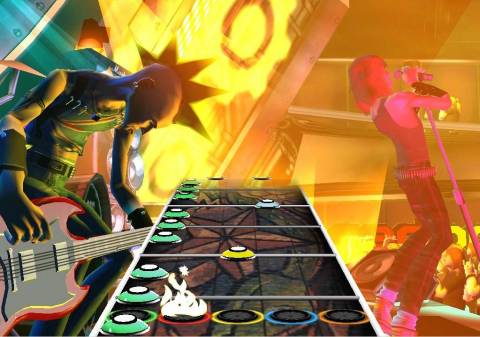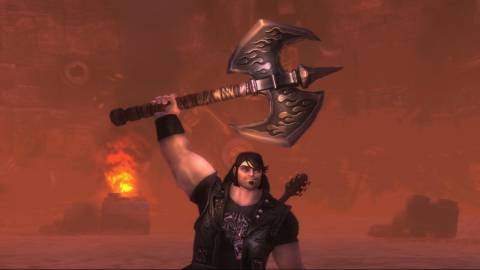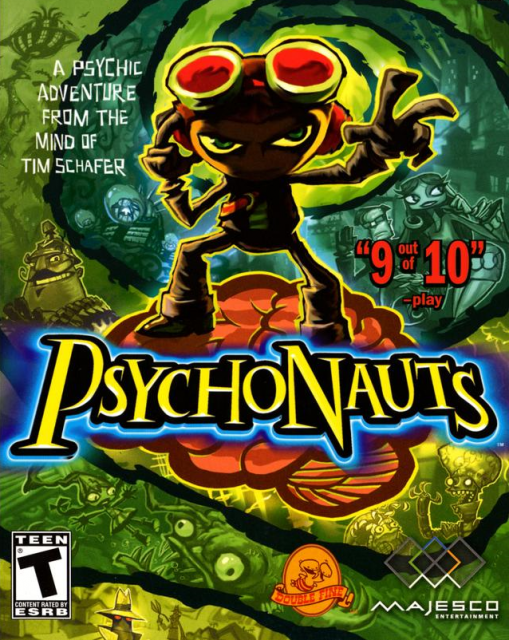Dialogue Options Vol. 1: Creating A Billion Dollar IP
By jjnen 19 Comments
Hello and welcome to the first edition of this experiment called ”Dialogue Options”. Here we put our collective minds together and share our toughts on a single issue each time. Hope is that by presenting wide spectrum of opinions like this we can leave our personal biases behind and think about the issues with an open mind. Without further ado, I present to you today's topic:

How to create successful new AAA IP? Boring terms ”AAA” and ”IP” are used here to express that we're answering this question from the publisher's point of view. Both commercial and critical success can be considered, but this question is mostly about when a publisher spends a huge amount of money, how does it get even more out?
Courting the Enthusiast
by mosespippy
Creating successful IPs takes time. New franchises are rarely ever a huge success at the start. The first instalment is usually the worst selling in a franchise. Franchises gain success over multiple instalments as they build upon repeat customers and attract new consumers. Those who purchase brand new IPs are the very informed gamer; they are the leading edge consumers. They will try any type of game as long as there is something to hook them. That hook can be good reviews, a good developer pedigree, previews that show off promising gameplay (whether it’s something old that is really well done or something new that we haven’t seen before) or something else entirely. Casual observers don’t see those sorts of hooks because they aren’t looking at the sorts of media that would expose them to it. The enthusiasts eat it up though.

If a company can sell the first entry of a series to these evangelical gamers then they’ve got a shot at having enough interest in a sequel that it isn’t a huge risk. The first game in a franchise doesn’t have to be the greatest thing ever. If the core of the game is fun or the writing is well done then there is a tolerance for the small annoyances from these seasoned gamers. They’ll want more of the good parts of the game. Streamlined improvements are expected to smooth out the small problems in sequels.

Games like Saint’s Row and Uncharted: Drakes Fortune were moderately successful in their sales but their sequels greatly surpassed the originals. They weren’t the greatest games but they were good enough that people would buy a second one. These return customers are also tastemakers. Their friends wait longer into a generation to purchase systems and aren’t familiar with the range of franchises and developers that their tastemaker friends are. When their friend tells them that they should try Game X then they will likely give it a shot. That’s why the second game in a series needs to be great. The return customers can more easily sell their friends on a game if it is so amazing that everyone is talking about it.
Ultimately the developers need to deliver a product that is as good as what they are showing. If you get a crowd excited with previews, trailers and demos but don’t make a game that lives up to the expectations then customers can feel burned or deceived. Enthusiasts will try new things but this hobby is expensive; they aren’t likely to give you a second chance.
Franchise the Makers
by Rappelsiini
To solve this problem we first have to understand why the big publishers are relying on the same names year after year. Answer can summed into two words: Reliable revenue. To elaborate a little further, consumers keep throwing money to the same things over and over again because there is trust towards that game series. From buyers point of view it can't possibly be more than marginally worse than the previous entry in the series (which they loved) and what if it's even better? There are numerous examples of this like CoD and Halo.

That said, the simplest, and I'd argue most riskless, way to sell a metric shit-ton is to utilize a known brand name. You know, in the vein of Sid Meier's SimGolf, Bioshock Infinite. Just slap something people recognize on the cover and they'll buy it, right?
Actually implementing that idea isn't going to happen in a snap of finger because to be recognized you have to have done something from where people can recognize you from. Recognition has to be earned by producing something good, hopely even great. And like that wasn't hard enough there has to be the confidence to brand that game from day one so people can start to relating your name with quality. It's not enough to be Peter Molyneux or Ken Levine – your name has to be also recognized and move masses same way as Brad Pitt or Johnny Depp.
All that jazz also applies to development companies but that goes with out saying.
This talk doesn't obviously concern gamers and that's why I was using words like ”consumer”. Like Ken Levine explained in Wired's interview why the cover of the upcoming Bioshock Infinite is like it is, a badass dude on the cover will sell more copies than something more ”artsy”. Fact is that bigger public, who aren't hobbyist or experts, don't have a good level of knowledge about games and are ignorant about that ”nerdy” stuff. It applies to games and everything else, though games have it worse compared to movies for example since they have a lot smaller coverage in mass media. To get wider recognition beyond just gamers new, original games have to be stamped with a brand name which works like a seal of quality.
AAAs Doing More Harm Than Good
by Mirado
Would it be better if we didn't have AAA releases at all? Sure, I love big budget, blockbuster movies as much as anyone, but are massive CoD-like releases doing more harm than good for the games industry as a whole? For one, companies are starting to sink more and more money into each release; some estimates had Kingdoms of Amalur going through $5M a month. That type of budget carries a massive level of risk, and that kind of risk forces these publishers to only green-light games that are (in their eyes, at least) sure bets. This can help put a vice-grip on creativity; Double Fine's Adventure couldn't get published through the traditional model, and games that do make it through can sink a company if they fail to make sales targets or can be subjected to massive amounts of executive meddling, which is exactly what happened to Psychonauts and Homefront.

Psychonauts is, by most metrics, universally loved. A quirky platformer with a unique story, great voice acting and solid mechanics, it should have done well in the market...or it least showed no signs of winding up as a massive, monumental failure Publisher Majesco banked heavily on both it and Advent Rising to help them post an expected $18M profit and wound up posting a $18M dollar loss. This crippled the publisher, forcing them to cut projects (including the nearly complete AAA title Black 9), caused their shareholders to sue, and eventually pushed Majesco into the "casual" games market. Psychonauts would eventually go on to sell in greater numbers on Steam, but by that point Majesco no longer held the rights.
Homefront was another example of AAA dreams gone wrong. THQ's gated green-lighting process forced developers to keep sending them prototypes without their committal to full development, so developer Kaos (already teetering on the brink of closure due to Frontlines) kept cramming as many bullet points as they could onto the back of the box until they won THQ over. When CoD hit, it started the tailspin. Orignally pitched as "Lost meets Red Dawn" to the THQ management (who loved the concept) Kaos spent eight months building throwaway code for a five minute E3 demo. The team didn't gel, the THQ audits went bad, the GM got thrown out...trying to keep up with the Joneses resulted in a mediocre shooter that killed a studio and ultimately contributed to THQ's demise. I encourage everyone to read Polygon's Homefront post-mortem; it goes into far greater detail and describes the incredible amount of pressure that a game of this size places on all parties involved.
Could these studios and publishes have survived if they aimed for smaller releases? Could we see more creativity at the top if these games didn't have $50M dollar budgets and executive babysitting? In the case of Kaos and Majesco, we'll never know. They were smitten by the AAA dream and were killed for it. That doesn't make AAA titles inherently bad, but I'd argue that this eternal drive for bigger budgets and larger releases is trampling too many studios (and recently, publishers) underfoot.
The Multi-Million Dollar Question
by Gamer_152
Perhaps it’s rather blunt, but I think the basic answer is that there is essentially no way to say “Here’s what will make a new AAA IP successful for publishers”. You can suggest methods of creating, marketing, publishing, or doing whatever else with games that may be potentially safer options than others, but even these often carry a far greater risk than I think they’re given credit for by most of the gaming audience.

On its surface, creating a new IP may not seem that difficult a feat, but a lot of the gaming community seem to look at the popularity of games or the number of units sold, and take these alone as reflections of how successful the game was for the publisher. We have to remember that this data must always be balanced against how much money is put into developing the game in the first place.
According to a 2010 report from Ibis Capital, the average Xbox 360 or PS3 game costs $15-30 million to develop, meaning that they would have to sell 500,000 to 1 million copies to break even. To put that in perspective the population of Luxembourg is only 524,900 people. If Polygon is to be believed, budgets for AAA games often spiral into the hundreds of millions (thanks to for bringing that article back to my attention, it’s well worth reading), and a game that cost $100 million to develop and sold at $60 a pop, would need to sell 1.6 million copies to break even. These costs aren’t going to go down either, they’re going to rise.
This is exactly why there have been so many people recently worried about the state of AAA gaming, and the practicality of even continuing to fund and develop what we know as AAA games. When a publisher like THQ can go bankrupt, when Ubisoft can lose $67 million in a year, or when EA can lose $276 million in a year, I think it’s clear that we’re very far from publishers finding a sure-fire formula for creating successful games full stop, let alone when you add the risk of trying to introduce something new to the market, and I remain sceptical of our ability to fully answer this question when it’s clear much of the industry have been falling over themselves because they’ve not had definite answers to this question.
Duder, It's Over
That's all for this time and I would like to thank you for reading this. Note that this is still an experiment in development so some changes might happen in the format in the upcoming weeks. If you are interested in reading more about this has a couple days old blog post of his own which loosely touches this topic as well.
Also I'd like to thank for creating that awesome banner and everyone else in our small group who got interested in this idea in the first place.
For now we have crew big enough to accomplish things I've set to the horizon, but if you are really interested to joining in, PM me. Also if you have ideas for new topics of discussion just post them here or send a PM.
